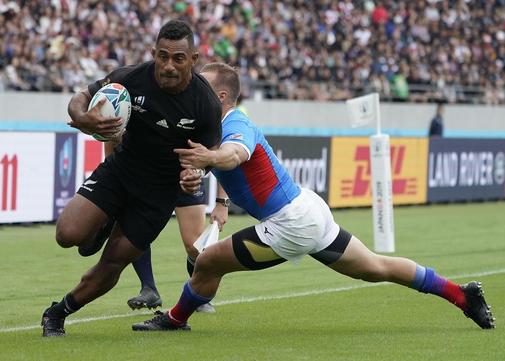Mako Vunipola, born in Australia, will be number 1 in the England team that faces his country of birth this Saturday in the quarterfinals of the Japan Rugby World Cup. At the end of the lead, with the number 8, his brother Billy, born in New Zealand, will line up. A little over a century ago both could have been a muscular metaphor for the expansion of the oval sport that landed in the colonies of the British Empire. But today they represent the reverse path, the journey from the periphery to professionalism. The father of the Vunipola, who was captain of Tonga, arrived in Wales to play two decades ago, when they were children. At dawn, Mako and Billy entered the radar of English clubs.
After dozens of internationalities, nobody doubts today of the genuine belonging of the Vunipola to the 'XV de la rosa'. Nor is it questioned for reasons of origin to his coach, the Australian Eddie Jones. The squad that directs part as a favorite to defeat their country of origin. 'The Wallabies' do not have English players, but 12 of the 31 summoned in Japan have other origins, although most grew up in Australia. If the earthly barriers tend to be erased, in a sport as traveler as rugby they are even more porous because of their peculiar geopolitics and traditions. The result, a normative maze sometimes incomprehensible to fans. The players, however, tend to rely on the feeling: the one who pushes at their side is their partner.
The New Zealand center Bundee Aki is the protagonist, due to his notable absence, of the second quarter-final crossing. It is used to playing a fundamental role in the line of Ireland, a selection with which it aligns because it plays and lives there. If he were not sanctioned, he would face the powerful 'All Blacks' of his home country and where he began his career. They are the team to beat the championship, although Ireland, trained by New Zealander Joe Schmidt, defeated them a year ago. The fifteen green has seven players born outside the island and another singularity. With Brexit or without him, he has historically brought together citizens of Ulster (belonging to the United Kingdom) and of the Republic of Ireland. A State and part of another with the same shirt.
New Zealand, this Saturday's rival, is the great talent exporter. Like Australia, it recruits players in the islands of its area of influence (Tonga, Samoa, Fiji), but in turn suffers the growing pressure of British and French clubs that try to sign future stars of that inexhaustible quarry in the Pacific. Even so, as 'Americas Rugby News' posted, New Zealand is not only represented in the World Cup by the All Blacks. Level players who did not reach the elite with them have flooded a good part of the 20 teams. His sports diaspora would have given to form almost two other teams in Japan.
Such a traffic is explained because to wear the shirt of a national team you don't have to be born in that state; just that one of the player's parents or grandparents did it. But it is also achieved by residing in the country of destination for three years continuously. Faced with criticism and fear that the great competitions will be distorted, the International Federation decided to extend, after the World Cup, that period to five years. It will barely stop the transfers. As the only limitation is not having debuted before in another absolute selection, the temptation will continue to launch contracts towards young promises willing to emigrate where rugby gives them money or a better place to live.
One of those destinations is France, which on Sunday disputes against Wales the third quarter final. The numerous incorporation of foreigners into internal competitions constitutes, for many critics, the main cause of the decline of the national team because it would be blocking the development of local players and eroding their glamorous style. An endless debate. Also the Welsh - favorite after prevailing in the last Six Nations - have taken the hook in the south. But, like the Gauls, they keep the additions to the selection in a reasonable number.
Of the thriving Japanese squad, which will try to give South Africa an unlikely dislike for the last quarterfinal game, it is often noted that it integrates 16 (out of 31) players born outside its borders. It is true, although many grew up there. But the economic development of its league has turned the country of the growing yen into a new pole of attraction for the Pacific rugbiers. Three players born in South Africa (Lambuschagne, Van der Walt and Matsushima, although the latter from a Japanese mother) are summoned to face their country of origin. The entire squad underlines for weeks before the microphones the wealth that gives them their diversity of origins.
Forgotten amateurism, elite international rugby is equating part of its performance to other sports. The better a team is, the less 'foreigners' it incorporates, but it precisely tries to incorporate those who raise their competitive level. In total, about 140 players have been in this situation in the 2019 World Cup. The risk, perceived by the International Federation, is that these flows, which have served to match the competitions, turn off the passion of the fans. That halo of romanticism fails to slow the progress of the business. The attachment to the roots will always seduce hearts, but each time they win fewer tournaments.
According to the criteria of The Trust Project
Know more- New Zealand
- Rugby World
- rugby
- sports
RugbyThe 'hat trick' of the Barrett, three brothers for the history of the World Cup
Rugby World Cup Japan surpasses its J-Day, with a record of Matsushima
More SportCanched two matches of the Rugby World Cup in Japan for a violent typhoon

